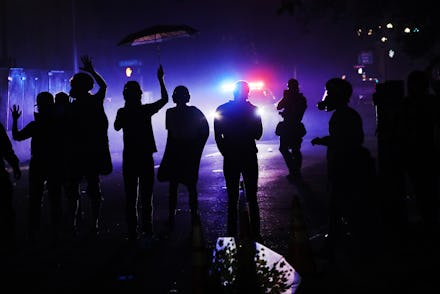No more incognito federal agents, Congress says

It's rare for Congress to agree on anything — representatives couldn't even pass a second coronavirus relief package until nine months into the virus's ravaging of the U.S. But last week, as Republicans and Democrats arrived to Capitol Hill to jointly override President Trump's veto of the annual National Defense Authorization Act (NDAA), they agreed on a line-item that also rebuked the Trump administration's "law and order" way of doing things.
The legislation included a provision to demand that federal agents dispatched to control civil disputes wear badges that clearly identify them by name and agency or department. There are two exceptions to the rule: one for agents who don't wear a uniform in their day-to-day operations, and another for undercover agents.
Though the legislative text in itself might not seem revolutionary, it offers a rebuke to this summer's deployment of federal agents to cities like Portland, Oregon, where protesters and reporters on the ground documented real-time kidnappings by unmarked and unidentified agents. In many cases, people weren't placed under arrest, read their Miranda rights, or told what they were being charged with, and agents at times released people after searching through their belongings. Multiple federal agencies were involved in kidnapping protesters off the streets using unmarked vans, namely the Department of Homeland Security (DHS) and the Department of Justice. In fact, the DHS's willingness to ignore the constitutional rights of protesters was one of the inciting events preceding the American Civil Liberties Union's call to dismantle DHS.
The NDAA language comes half a year after after House Speaker Nancy Pelosi wrote to Trump urging him to demilitarize the government response to protests. More than the use of federal armed agents to quell people taking to the streets, "some officers have refused to provide identification and have been deployed without identifying insignias, badges, and name plates," Pelosi wrote. "The practice of officers operating with full anonymity undermines accountability, ignites government distrust and suspicion, and is counter to the principle of procedural justice and legitimacy during this precarious moment in our nation's history."
As Kimberly Wehle, a professor at University of Baltimore School of Law, pointed out in an op-ed for The Hill, there are multiple dangers to allowing federal agents to operate in ways that makes them unaccountable to the law. A lack of identification gives way to other forms of violence, like that perpetrated by the white supremacist Proud Boys group. The group's followers are not only allowed to operate with near-impunity as it relates to local police action, but their leader Enrique Tarrio said that they would protest the Wednesday certification of Electoral College results "incognito." He elaborated that Proud Boys would wear all-black and operate in small groups — similar to how DHS agents operated last summer.
To be sure, the NDAA legislation is a drop in the bucket in terms of the allowances federal agencies and departments have when it comes to arresting and surveilling protesters. But it's still a reminder that small checks and balances on executive power are possible, however after-the-fact they may be.